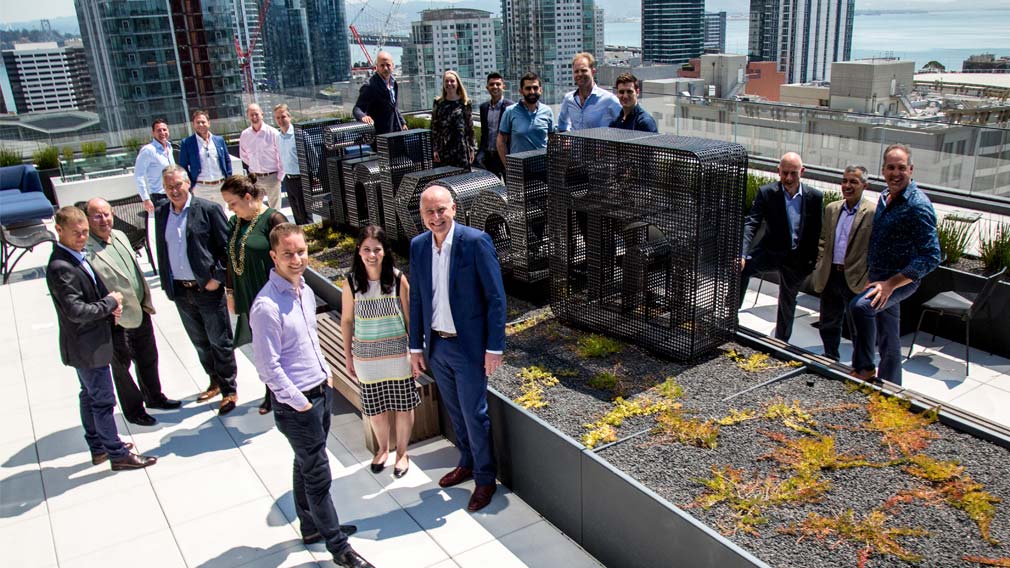Silicon Valley tour ‘an eye-opener’ for executives

Twenty Australian business leaders visit LinkedIn as part of a global study tour through Westpac’s Business of Tomorrow program. (Supplied)
A Silicon Valley masterclass is preparing a new wave of Australian businesses to take on the world.
Twenty Australian companies ranging from nine-person startup to an ASX-listed entity have had the opportunity to meet and learn from the multi-billionaires who have helped reshape society.
The businesses are on a tour of the Silicon Valley sponsored by the Westpac Businesses of Tomorrow program and inside a week have gained insights into how top companies such as Uber, Airbnb, LinkedIn and Salesforce achieved massive scale.
It’s not just software companies that have benefited from the program. Anthony Kittel is chief executive of Redarc, a manufacturing company based in South Australia that produces advanced electronics for automotive, defence and mining customers in seven countries.
“It’s just been eye opening to see the scale of opportunity once you widen your vision to a global setting,” Mr Kittel said, citing a visit to Airbnb as a highlight.
Joe Gebbia, co-founder of Airbnb, told the businesses that their survival through challenging early years came down to a relentless focus on customer service. “Fall in love with your customers, not your product,” he told The Australian.
“Your product will eventually change as technology changes but the relationship with your customer is what endures.” Mr Kittel said what was extraordinary “was the power of the brand that these companies have created”, Mr Kittel said.
“I hadn’t thought about brand in the same way for my industry until I saw how a company like Airbnb puts their message at the heart of everything they do.” Mr Kittel said the first thing he would do when he got back to Adelaide was put more of his budget into expanding the export market.
“I really grasp now how big the pie is. We need to get a piece of that.”
Allen Blue, co-founder of LinkedIn, reinforced the well communicated concept of failure as a core component of Silicon Valley’s extraordinary success, but added that it was how people created new networks in the face of failure that was the source of creativity.
“There are a lot of really great people doing interesting work and a lot of them fail. But they recombine with other people in their networks to bring their ideas to new problems to bring their insights to a new group of people and their way of working. It’s a powerful mechanism for a constant recombination of people and ideas and it’s backed up with the right kind of institutions; educational, venture capital, technical to make it all work.”
For Rami Weiss, chief executive of Healthshare, a health tech platform, which boasts 90 per cent of Australian doctors using his portal, it reinforced his global ambitions.
“You hear and read about these companies, but sitting in a room with these founders, seeing that they are normal people, even humble, you realise anything is achievable, there are no limitations.”
Throughout the trip, according to Steven O’Keeffe, product manager of Brisbane-based online construction marketplace PlantMiner, the standout message has been the importance of culture. Each company stressed how it was culture that secured the best people in the quest for talent, and each presentation commenced with a statement of the company’s mission, something that was echoed in perfect clarity by founders and executives alike.
“Every company had an obsession with attracting and retaining talent. Sure they had these amazing office spaces, but despite the perks, the food etc, the mission and values were their key selling points. When I go back to Australia, we’ll work immediately on refining our narrative to succeed in this global war for tech talent.”
Hana-Lia Krawchuk, founder of babywear clothing company Love to Dream, said each of the tech firms the group had visited had been incredibly generous with their time and open and transparent about their business models. But despite that generosity, she was left in no doubt about the competitive nature of these majors.
After meeting with Polly Sumner, a 40-year veteran of Silicon Valley who had helped grow first Oracle, then Salesforce into multi-billion-dollar companies, Ms Krawchuk had a much clearer view of how the tech industry evolved to break open formerly integrated business models, capturing value and stealing margin along the way.
“She told us that the most important thing we need to do is to find out where the fat is in our business,” Ms Krawchuk said.
“For that is what competitors will try to do, whether in our supply chain or our distribution or wherever. That was how Amazon had become so successful.”
Competition is only going to heat up, the business of tomorrow participants head to China next week with a prophetic warning from LinkedIn’s Allen Blue ringing in their ears that Beijing was becoming a rival hotspot for innovation.
“Right now Beijing is producing at least as many great, or potentially great companies as Silicon Valley is,” Mr Blue said.
This content originally appeared on The Australian on August 7, 2017. Reproduced with permission.
The views expressed are those of the authors and do not reflect the Westpac Group.

